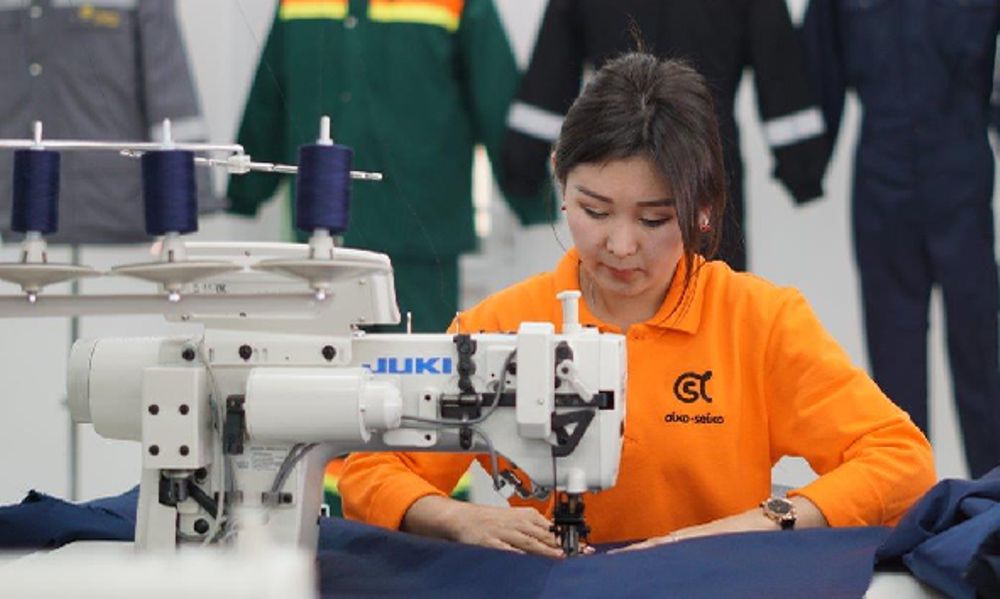Workwear manufacturer in the Kyrgyz Republic helping to fight coronavirus pandemic
Faced with the coronavirus crisis, the Kyrgyz Republic declared a state of emergency in late March and shut down its economy. Despite being hit the hardest, private sector companies have played a major part in the response. They are donating funds and supplies, voluntarily feeding doctors and the police, and supporting public initiatives to protect the most vulnerable.
Aiko Seiko, an entrepreneurial EBRD client, decided to do its bit by producing personal protective equipment. Aiko Seiko LLC is a family business based in Jany-Aryk, a village near Karakol in the Kyrgyz Republic. Normally, this company – a beneficiary of the EBRD business advisory support funded by the European Union – makes protective clothing and workwear for the construction, gas and oil industries.
As imports of masks and gowns have completely stopped, Kuban Zhusuev, Aiko Seiko’s director, saw a pressing need to boost the domestic production of vital medical supplies. The company quickly reoriented its clothing production to making medical isolation gowns and single-use masks.
“Production helps the business to keep moving but it is rather more about redirecting our resources for a good cause. We will supply 1,000 gowns and 52,000 masks under our first order from the local authorities,” says Kuban, whose company is preparing to deliver more such orders.
Aiko Seiko’s seamstresses showed solidarity and volunteered to work on weekends to complete this particular order on time. Before placing the order, a special committee reviewed the quality of samples and verified compliance with medical protection standards. The committee also took note of the production quality standards in place at the factory.
The company started upgrading in 2019. Before that, one major challenge that Kuban faced was to keep production efficient while still meeting the stringent quality standards of his clients. In some cases, even though Aiko Seiko had the necessary EAEU certifications in place, Kuban made the difficult decision of not taking on lucrative, high volume contracts as the company could have had trouble meeting production deadlines.
“To compete in the market we needed to increase our productivity and keep up with new technologies. We needed equipment that does the same job in 10 seconds instead of 7-10 minutes manually,” says Kuban.
In 2016, Kuban started seeking capital to expand production and introduce higher quality standards. This required a comprehensive investment proposal that Kuban eagerly started working on. However, this effort backfired as Kuban realised that this was a very time-consuming task. Without his daily supervision, he noticed that sales declined and things were getting worse.
Two years later, Kuban found out about the EBRD’s advice for small business programme, and applied immediately, receiving business advisory support funded by the European Union. In January 2019, Kuban tasked an experienced local consultant with raising funds for modernising Aiko Seiko and arranging the documentation to obtain a loan.

The consultant collected all the required information, analysing financial statements and reports, and assessing the production site and the required equipment upgrades. Kuban received the full application package – an investment memorandum along with a business plan and a financial model – and even had a series of presentations for the lender delivered on his behalf.
The assistance led to a decisive success for Aiko Seiko, unlocking access to a US$ 600,000 loan from a local commercial bank.
With new finance, the company has already upgraded 70 per cent of its equipment, increased the number of permanent employees from 54 to 62, and rebuilt its production site. With the new capacity, Aiko Seiko has so far attracted three new major customers.
Covid-19 has forced the economy and business to halt and forced most companies to consider their very survival. Despite that, Kuban is optimistic about the future. When normal life resumes, he is planning to complete equipment upgrades and hire up to 100 employees in his village and the capital Bishkek. He is confident that Aiko Seiko can now take on much larger orders and that the company is set to become a top protective clothing producer in the Kyrgyz Republic, and he has set the goal of expanding into new markets, both regionally and further afield in Europe.
Aiko Seiko is particularly proud that it provides over 60 residents in the Jany-Aryk village with steady employment and income amid ongoing labour migration from Kyrgyz Republic to Russia and from rural to urban areas.
For now, it is focused on doing its part in supporting the country during this public health crisis.





























